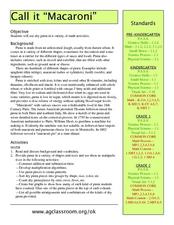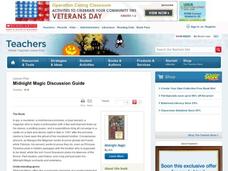Curated OER
Texture Hunts and More: Madonna and Child with Saints
Students investigate different painting techniques by studying classic works of art. In this art history activity, students observe the famous Madonna and Child with Saints painting and describe the texture and images they notice....
Curated OER
Roman Holiday in Google Earth
Students plan an itinerary for an educational trip to Rome. In this research skills lesson, students use Google Earth to conduct research for their project in their travel teams. Students also set up blogs to share their progress through...
Curated OER
Cooking in Britain Today
Learners explore British cooking vocabulary. In this ELL vocabulary instructional activity, students identify and describe various foods, match foods with adjectives, discuss their opinions about British cuisine, then read food critic...
Curated OER
Pre-AP Strategies for French Language and Culture
Build vocabulary, fluency and confidence in your French speakers by having them participate in some of these engaging activities. Several suggestions are given, but you will have to design the actual lesson yourself.
Curated OER
Chapter 35: Labor-Market Issues - Unionism, Discrimination, and Immigration
A discussion on American unions, employment discrimination, and collective bargaining transitions into a larger conversation about the workforce. A graph that details the amount of immigrants from various countries will surely get your...
Curated OER
Call it "Macaroni"
Who knew there were so many fun educational opportunities featuring pasta? Scholars read a brief informational text about the history of pasta (note that "macaroni" is spelled two different ways, so address this if kids are reading...
Concordia University Chicago
The Pietá by Michelangelo Buonarroti
Why is arts education so important? It builds critical thinking, analysis and creative problem-solving skills. Learners review the life of Michelangelo Buonarroti, and then analyze his piece, The Pieta. After that, they'll sculpt a human...
Concordia University Chicago
A Bar at the Folies-Bergere by Édouard Manet
Observation is a key skill any scientist, artist, or writer needs to hone. Learners first discuss Manet's A Bar at the Folies-Bergere, then they set up a place to observe the people in their school. They closely observe and sketch what...
Dade Schools
Ancient Greece
What role does geography play in the development of a culture? How does ancient Greek culture still influence civilization today? These and other questions are explored in a unit study of Ancient Greece. The overview of the unit provided...
All for KIDZ
Building Relationships: The Orphan of Ellis Island
Family and friendship are two very important themes of the historical fiction novel The Orphan of Ellis Island by Elvira Woodruff. From video clips and writing prompts to reader's theater and family interviews, this resource provides...
Scholastic
Midnight Magic Discussion Guide
This discussion guide accompanies the fiction book Midnight Magic written by Avi, enforces story elements, inferences, and theme/plot. Have the class work on it over time, it will engage even your reluctant readers.
Scholastic
Drones Take Off
Ever wonder what drones are doing high above us in the sky? This article gives your class an insight to what those robots in the sky are doing. After reading an article on drone technology, pupils are prompted to respond to a variety of...
AAAS
Identification and Classification of Grassland Plants
Take learning outside and start classifying grasslands. Young ecologists observe grassland plants in order to classify them into the appropriate species by family. They note their characteristics and where they grow. A true field...
Philadelphia Museum of Art
Physics at the Art Museum: Kinetic Energy, Potential Energy, and Work
Connect science, math, and art for a true interdisciplinary lesson! Learners explore simple machines in art. Through analysis with a physics app, they identify positions of kinetic and potential energy and make conclusions about work.
Chandler Unified School District
Art Masterpiece: Leonardo’s Inventions—Leonardo da Vinci
Leonardo da Vinci is the focus of a hands-on activity that encourages scholars to become inventors. Pupils brainstorm and sketch their idea, compose a detailed depiction using a mirror writing technique, and antique the paper for a...
Curated OER
The Rise of Fascism
Students explore the variety of events and the people who would shape Europe during the 1920's, describing how this culminated with the Second World War. They create a timeline of ten pre-war events or people with the corresponding date...
Curated OER
Food and Countries Match
Beijing duck? Italian pizza? Japanese sushi? Language learners match food words with their country of origin. An answer key is included with the colorfully illustrated worksheet.
Curated OER
Lesson Plans for Portrait of the Young Countess Schouvalof
Pupils analyze the art for the Young Countess of Schouvalof and also practice recognizing the work of Le Brun, Leonardo da Vinci, and Andy Warhol. In this portrait art lesson plan, students analyze copies of the artists work and mark on...
Curated OER
The Alphabet is Historic: The Roman Alphabet is our Alphabet
Students show that the Greeks, Phoenicians and Romans lived in the Mediterranean area. They give reasons why the alphabet was important for the Romans. and say that the Romans developed the alphabet they are learning in school.
Curated OER
Technology in World War One
High schoolers research the types of technology and weapons used in World War I. They form groups representing countries and simulate an arms auction each bidding for the weapons of their choice. They compare their research to the...
Curated OER
History / Introduction of Pythagorean Theorem
Learners explore Pythagoras and the history behind his theorem. They work together to solve a proof that is embedded in the lesson.
Curated OER
Ubi Est Mantua?
Students chose Latin authors, their birthplace, life and works. They examine pictures of an Italian city and decide which Latin author it could be related to. They answer questions in Latin.
Curated OER
A Month of Mapping Literature
Explore the world through literature! With push pins to mark where each story came from, learners examine cultural differences, geographical location, and how those elements affect story content. This lesson could use deeper development,...
Curated OER
A Sample of What?
Students are introduced to the connection between women and the textile industry. Using primary source documents, they complete a handout on how gender roles have changed over the years. They examine a sampler which is connected to the...
Other popular searches
- Famous Scientists From Italy
- Volunteering Italy
- Unification of Italy
- Christmas in Italy
- Map of Italy
- Renaissance Italy
- Lesson Plans for Italy
- Lesson Plans on Italy
- Ancient Italy
- Blank Map of Italy
- Art About Italy
- Italy Fascism

























